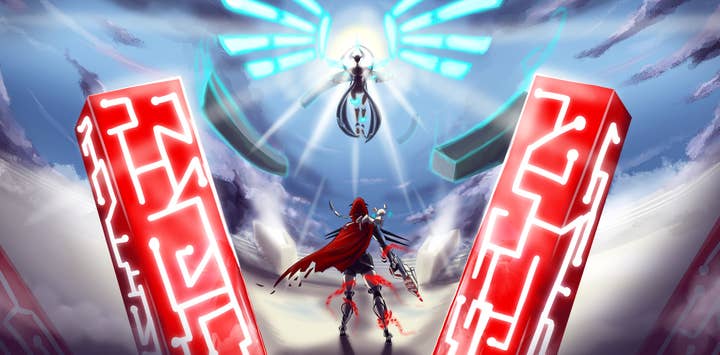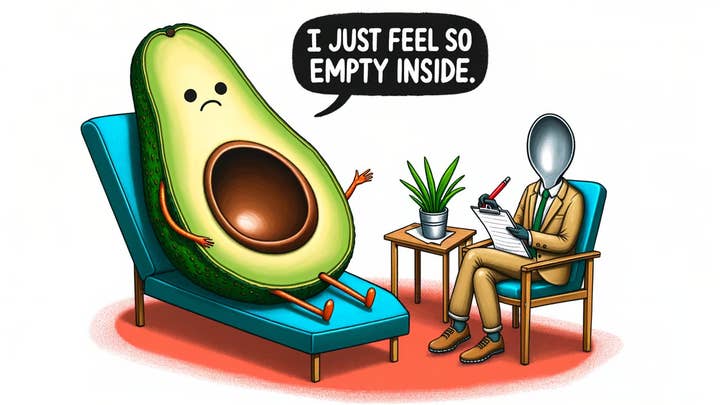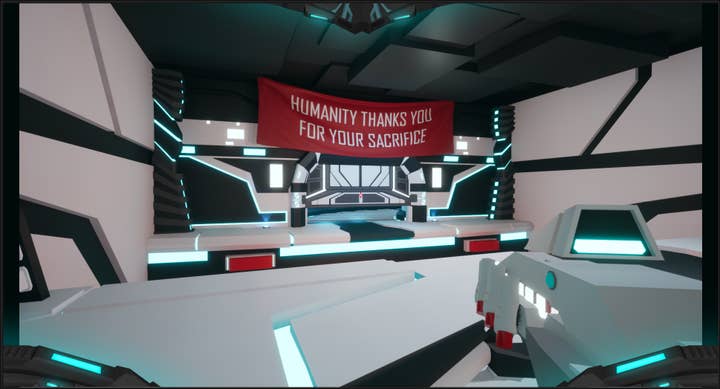Be thankful this didn't happen to you | This Week in Business
The cautionary tale of Red Trigger developer Bold Spirit Game Studio, and a look at ex-Twitch CEO Emmett Shear's short-lived new job
This Week in Business is our weekly recap column, a collection of stats and quotes from recent stories presented with a dash of opinion (sometimes more than a dash) and intended to shed light on various trends. Check every Friday for a new entry.
It's Black Friday today, but sometimes I worry we can lose focus on the true meaning of the day, with the hyper-commercialist celebration being forgotten around all the "reflections on gratitude" nonsense of the neighboring US Thanksgiving.
It's not so much a problem here in Canada, where we booted Thanksgiving to October, giving Black Friday the breathing room it needs for proper observance and letting us get a head start on the thankfulness over those sluggards to our south. No inducing carb-loaded comas mere hours before the sales go live for us!
Even so, out of deference to our American readers (and our American writer), we feel compelled to add a gimmicky Thanksgiving angle to the column this week.
So in that spirit, we'll talk about two things (almost) all of us can be thankful for this week. First, that what happened to Maxime Vézina hasn't happened to us. And second, that we didn't just have as visibly, publicly, and undeniably clownish a week as OpenAI.
What happened to Maxime Vézina?
Vézina is the founder and creative director of Bold Spirit Game Studio, the developer of the Red Trigger franchise of FPS puzzle games that counts Portal, BioShock, Metroid Prime, and Antechamber among its influences.
In a panel on commercializing indie games at the Montreal International Game Summit earlier this month, Vézina told a story about dealing with Steam, the details of which drew anguished groans from the assembled developers on more than one ocassion.
After seeing the effect Vézina's story had on his peers, we thought it would be good to inflict the same pain on our readers draw attention to his plight as a cautionary tale, so we set up an interview and Vézina was gracious enough to dive a bit deeper into the details with us.
The original Red Trigger was actually a game Vézina made on his own as a final student project and released on Steam through its Greenlight program in 2016 for free, primarily as a way to get his name out there and help land a job. It was warmly received, with 250,000 people downloading it and about 2,000 reviews, with an impressive 90% positive rate between them.
After a four-year stint building AAA experience at Ubisoft Montreal, Vézina jumped ship to establish Bold Spirit, put together a team of developers, and work on a sequel to Red Trigger. By November of 2022, he had begun pitching publishers to get funding for the sequel, but kept running into the same two issues.

"One comment that came quite often was that they were unsure about publishing a game sequel when they didn't publish the first one," Vézina tells us.
That seemed like an easy enough fix. Vézina asked Steam to rename the original Red Trigger to Red Trigger Prologue and the sequel would just be called Red Trigger. Slightly confusing for people familiar with the student game, but not the biggest deal.
"The other comment was, 'We don't know your team yet or if you can deliver. And you've never had the creative director title before so is there some way you can prove to us you're a team that works?'"
That one was a bit harder to address, but it seemed a reasonable concern. The team figured it could create a more polished remake of the original student game – which was only about an hour long – as a way to show publishers what they could do on a smaller scale and demonstrate their ability to ship something.
The remake rebuilt the UE4 student game from the ground-up in UE5. It had entirely redone graphics, added voice acting, speedrunning options, collectible audio logs detailing the franchise's lore, and even revisited the gameplay with a new vaulting mechanic and a Metroid Prime-like scanning system.
They also created a shot-for-shot remake of the original trailer for the student game as an homage, which would become important a little bit later.
They began work on the remake in January of this year and created a Steam store page for it. Understanding the potential for customer confusion, Vézina requested that the student project version of the game be renamed Red Trigger Prologue (Alpha Version), while the remake would carry the Red Trigger Prologue name. Maybe not the best idea in the world, but Steam approved the changes anyway.
Unfortunately, the remake didn't come together quite as quickly as they had hoped, and the temporary release date on the remake's store page came and went without the game launching. That was the point where Vézina discovered that developers cannot change temporary release dates themselves once the date has passed, and he had to ask Steam Support to change the date for him.
Which wouldn't have been a problem, but it called attention to the Red Trigger naming conventions.
Steam... deleted the store page for the remake, along with the 500 wishlists users had for it
"That's when they asked the question, 'We see you have three games called Red Trigger: The original, the remake, and the sequel,'" Vézina says. "'Can you explain the relationship between those?'
"I think they didn't understand the strategy there, which I admit was a bit our mistake as well because of the naming or Prologue and Red Trigger. For them a prologue is a sneak peek or a demo you don't usually sell."
Steam thought Bold Spirit was trying to sell the same game under multiple names on the store, and deleted the store page for the remake, along with the 500 wishlists users had for it. Vézina notes that Steam didn't have a build of the remake or anything; it was simply making the judgment based off the games' store pages, screenshots, and nearly identical trailers.
In the letter informing the team of its decision, Steam suggested releasing what was the remake as an update to the original student game.
Vézina responded suggesting changing the games' names again to better avoid confusion and point out that Steam allows other remakes with updated graphics and content to be sold alongside the originals, but the storefront wouldn't budge. It offered other options that Vézina didn't think addressed the problem, and he ultimately relented.
The remake launched as an update to the original Red Trigger in August, and the price was similarly updated from free to CAD $9.
"What they didn't tell me is that resets the review summary," Vézina says. "The reviews are still there. If you scroll down, you see 2,000 reviews, but in the summary, it says 33 reviews. It still shows as a 2016 game, and it doesn't look good to have 33 reviews for a seven-year-old game."
It also didn't help that as an update, it didn't receive any of the placement or wishlist notifications that a new release would benefit from. (The original Red Trigger had 16,000 people wishlist it even though it was a free game.)
"What they didn't tell me is that resets the review summary. The reviews are still there. If you scroll down, you see 2,000 reviews, but the summary says 33"Maxime Vézina
As for how the remake has done since its launch, Vézina bluntly assess it as "very badly."
"Last time I checked we had 25 sales on it," he says. "I can't know how much it would have performed as a new game, but I can bet it would have been way more than that, especially since the goal was to appeal to new people, but also the fans [of the original], those 250,000 people who downloaded the game over the last seven years. The issue is the game is already associated with their Steam accounts, so they get the remake for free even though we updated the price from free to paid."

Making matters worse, the remake launched alongside a Red Trigger 2 crowdfunding campaign and directed people to the Kickstarter page, but it didn't do much good considering how few people saw it. Vézina readily acknowledges there were other issues with the Kickstarter campaign, but it's not hard to see how a successful launch for the remake could have changed things.
Bold Spirit had been counting on the sales of the remake and the crowdfunding campaign to carry it through the process of searching for a publisher.
"Since we didn't get much revenue from the remake and the Kickstarter flopped, I sadly had to let go of my team"Maxime Vézina
"Since we didn't get much revenue from the remake and the Kickstarter flopped, I sadly had to let go of my team because it's been three years on my own money and we basically ran out."
Bold Spirit plans to launch the Red Trigger remake on the Epic Game Store and through other avenues, and there's some hope it will fare better with those than it did with Steam. Vézina is also still looking to find a publishing deal for Red Trigger 2, but Bold Spirit may soon be backburnered in favor of a day job if he can't find one.
He's sharing his story now to serve as a cautionary tale for other developers and give them some simple advice that could help them avoid a similar situation.
"Always keep an eye on the temporary release date to make sure you don't go over it," Vézina says. "Everything started from that point. [The remake page] was approved and public for six months, so if we didn't have this tiny technical issue, this probably would have never come up.
"The second thing I would say is especially if you make a remake, make it very clear what the differences are between the original and the remake, even if it's just a graphical update. Don't do a trailer shot-by-shot exactly the same.
"Avoid putting alpha, beta and prologue on a product you mean to sell. Steam might see it more as a demo or something like that, and wanting to sell a prologue is problematic to them. So if you consider it a prologue, maybe put it in the Steam page description but not the title."
Despite his situation, Vézina is far more measured in his assessments of Steam and how it has handled things than I would be in his situation.
"We did make mistakes on our end as well so I don't want to put the blame completely on Steam," he says. "But I think there's been honest mistakes on both sides."

Shear nonsense
Ok, now that the horror story is out of the way, let's go to clowntown.
On Monday, former Twitch CEO Emmett Shear was named interim CEO of ChatGPT and DALL-E maker OpenAI after a wild weekend where the board fired previous CEO Sam Altman and named chief technology officer Mira Murati interim CEO, then began negotiating with Altman about a return to the company, then named Shear its third CEO of the week, but also on an interim basis. Reportedly, he was not their first choice, as they tried to merge with rival AI firm Anthropic and have its CEO take over.
Also, as soon as Altman was ousted, major OpenAI investor Microsoft swooped in to hire him and threatened to poach essentially the entire OpenAI workforce, which was reportedly unhappy with Altman's dismissal.
The idea that Shear would be trusted to shepherd development of a technology that promises/threatens to reshape society is frankly horrifying given the utter lack of concern he demonstrated for harms inflicted on people during his time at Twitch, as detailed in a 2020 feature we ran with all the content warnings.
(We'll repeat a couple of those warnings here; the rest of this article deals with harassment and suicide.)
When the platform's initial community guidelines were being formed, we were told Shear insisted that it be a platform with no opinion, such that the Ku Klux Klan should be free to stream on Twitch provided it didn't break other rules.
Twitch (and its predecessor Justin.TV) also failed to create moderation policies on how to handle livestreamed self-harm. Even after a teenager committed suicide on stream in 2008, the platform neglected to adopt such policies for years afterward. In 2011, Twitch left its community manager to improvise his response to one such attempt; it was his first day on the job.
"There was a general apathy for sound decision-making"A former Twitch executive describing the company's leadership
Twitch had exactly one full-time moderator through 2013, when Microsoft and Sony insisted it actually invest in safety in order for the streaming service to be built into the Xbox One and PS4.
QUOTE| "As long as nobody died on the site, they could not give a shit. That was a priority. Just make sure no one dies on the site. If they do, scrub it. Delete everything. I think they were more concerned about that kind of stuff and being sued by Telemundo and UFC for sports. That was their big priority. Otherwise they didn't care." - An early Twitch employee said management viewed content moderation as a black sheep and a cost center rather than a key requirement of the business.
Twitch also ignored streamers and employees alike who described the harassment the platform was facilitating.
QUOTE | "There was a general apathy for sound decision-making. It tended to be very emotional. It tended to be very clique-y. Who was in whose ear dominated the conversation, whether it was the right decision or not. With the senior leadership, I found it to be extreme arrogance." – A former Twitch executive described the company's leadership group as two-faced and chaotic, prone to sniping and fostering a toxic culture at the company.
Fortunately, Shear's time as interim CEO of OpenAI was brief. Late Tuesday night Pacific time, OpenAI announced that Altman was back as CEO and it had a new board of directors. Shear put up a Mission Accomplished tweet saying he was "deeply pleased by this result."
As much as I believe Shear was utterly unfit to lead OpenAI, I can't say I have any more confidence in Altman. Too often, the people in charge of potentially world-shaping innovations seem to be playacting their favorite Watchmen characters. Dr. Manhattan in the streets, Ozymandias in the broadsheets. (And maybe a pitiful bit of Rorschach in the tweets.)
QUOTE | "I have narrow interests in technology, I have no patience for things I'm not interested in: parties, most people. When someone examines a photo and says, 'Oh, he's feeling this and this and this,' all these subtle emotions, I look on with alien intrigue." – In a 2016 New Yorker profile, then-OpenAI Sam Altman seems tired of being caught in the tangle of our lives.
The same article has Altman joking that he should practice going to the bathroom more so we don't catch on that he's an AI and expressing disappointment with humanity over the failure of his start-up Loopt, an app that would tell you where your friends were.
QUOTE | "We had the optimistic view that location would be all-important. The pessimistic view was that people would lie on their couches and just consume content — and that is what happened. I learned you can't make humans do something they don't want to do." – Altman explains that he didn't fail because the idea was bad or the execution was poor; he failed because he thought too highly of humans. He won't make that mistake again.
Altman also has a doomsday prepping hobby, because when the people in charge of a technology insist it has world-ending implications, it's not concerning at all that they spend their free time thinking about exactly how they will bug out and leave the rest of us to die if the shit ever hits the fan. And not just thinking about it, but then taking the logistical steps necessary to follow through on such a plan.
Again, this is his hobby. The thing a person does for fun.
And because the people telling us AI will change the world have overlap with the people telling us blockchain would do the same, we should point out Altman is behind the Worldcoin cryptocurrency start-up that scanned irises to make a "World ID" that would "prove" someone interacting online was a human and not an AI bot. But in an example of the foresight and care exercised by the past and present CEO of OpenAI, Worldcoin failed to consider that there would be a black market for World IDs to be transferred between people, which completely undercuts the identity-confirming function that was the one thing the tech supposedly did.
Whether you're worried about AI hurting people in the present or turning them into paperclips in the future, it is imperative that it be pursued with wisdom, forethought and caution instead of by people determined to claim this year's Biggest Business Debacle award from frontrunners like rebranding Twitter to be (even more) white supremacist and anti-Semitic, Unity's cack-handed attempt at extorting existing business partners with the Runtime Fee, and Warner Bros. Discovery making movies and then not releasing them for tax breaks.
Ideally, if these frontiers of technology are going to be pushed, they should be pushed by people who understand the burden they are choosing to carry and feel the proper weight of it with every step, people who are guided by a deep sense of humanity shared with the billions of people their work may impact, rather than a deep sense of rapacity for the billions of dollars their shares might sell for.
The side show at OpenAI this week is as strong a sign as any that the people driving the field right now simply do not qualify.
The rest of the week in review
STAT | $184 billion – Newzoo's revised 2023 forecast, behind only 2021's $193 billion and still about $5 billion higher than 2020.
QUOTE | "There still is plenty of cash, plenty of interest, and plenty of willingness to do deals on the part of not only strategic buyers that we all know, but also private equity companies and other large financial institutions that want to get exposure to games." – In a panel at the Montreal International Games Summit, Agnitio Capital founder Shum Singh says companies are taking longer and being more careful about their mergers and acquisitions these days, but there's still plenty of buyers in the market.
STAT | 710 million – Niko Partners' estimate of the number of gamers in China by year's end, a 1.63% increase over 2022. It also expects that number to continue growing at a 1% compound annual growth rate through 2027.
STAT | $4 billion – Royalties paid to indie creators by ID@Xbox, the indie arm of Xbox, the third-most popular console maker of the past two generations.
STAT | 2.3% - The year-over-year decline in console and PC game sales across Europe in October, according to GSD. While it's a decline, you could still see it as good news considering October of 2022's numbers included the release of Call of Duty: Modern Warfare 2, while this year's Call of Duty: Modern Warfare 3 was launched in November instead.
QUOTE | "It's always a tricky question" – Embracer's interim chief strategy officer Phil Rogers, when we asked how many more layoffs we should expect from the company.
QUOTE | "We were willing to fight them in court if necessary." – Epic CEO Tim Sweeney testifies that the Fortnite maker was so determined to get the PlayStation 4 version of the game to support cross-play with other platforms that it would have sued Sony over it. In related news, I'm thinking of taking legal action against IGN for not linking their readers to This Week in Business.
QUOTE | "About 7% of Fortnite outfits can only be equipped in islands rated Teen. Over the next year, we will enable most of these outfits to be compatible with all ratings by having them auto-adjust their appearance based on the island you want to play." – Epic explains why some cosmetic outfits with scary stuff or guns would be unusable in user-created islands carrying an E for Everyone rating.
Never mind that Fortnite itself carries a T for Teen rating, and the guns that got some of these cosmetic items restricted are kind of a big part of what is a battle royale shooter game played by tons of kids that frequently serves as a marketing platform for R-rated movies and M-rated games.
QUOTE | "We have seen other platforms making awkward moves with their pricing and terms, so we thought, what if we did the opposite, something that could actually be good for developers? Our success is measured by the number of people making games!" – GameMaker's Russell Kay takes a (richly deserved) shot at Unity's Runtime Fee debacle in explaining the company's decision to make its engine free for non-commercial use (except on consoles), with a one-time license fee for commercial uses instead of the subscription model it had previously used.

